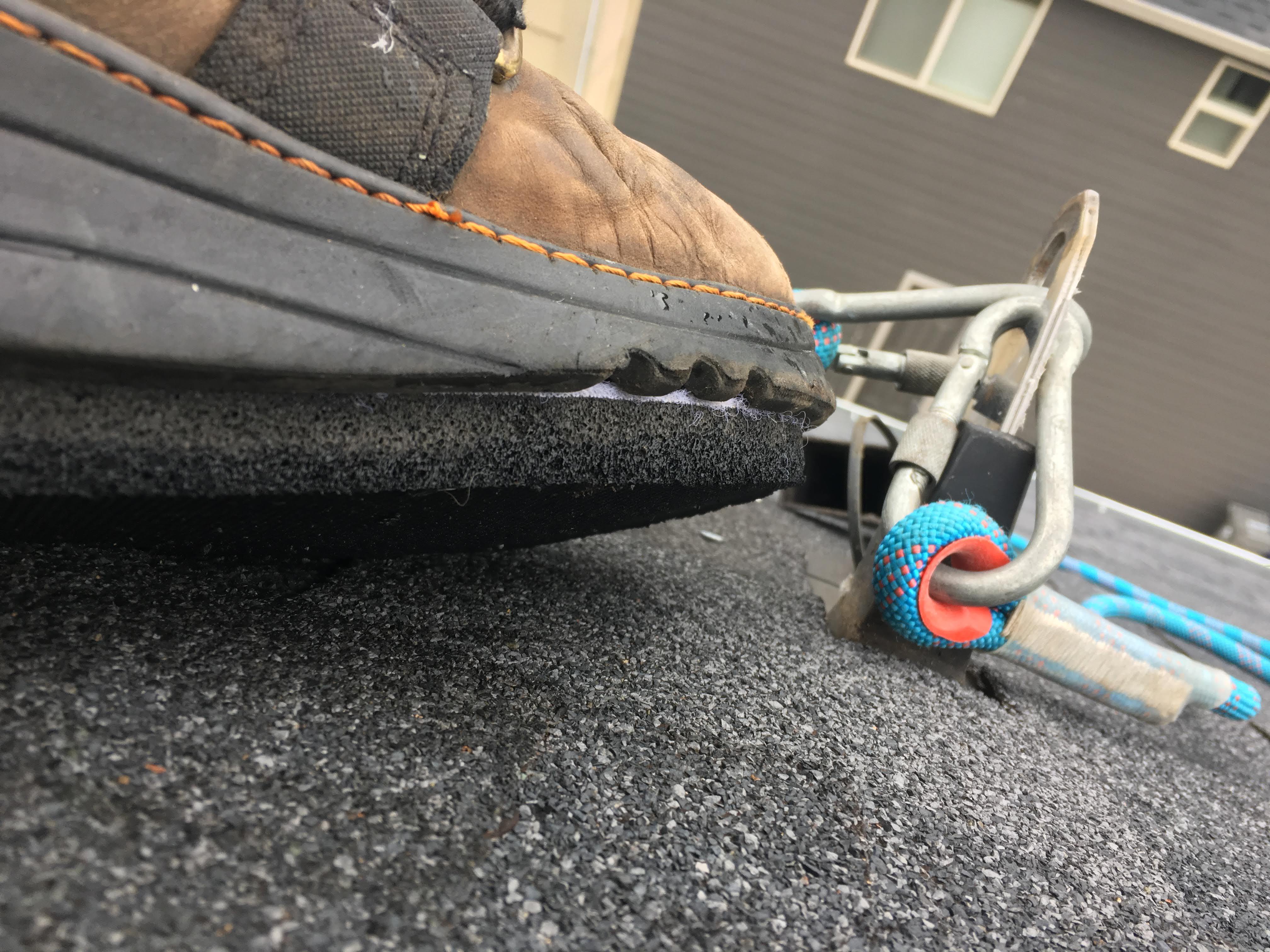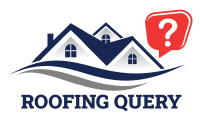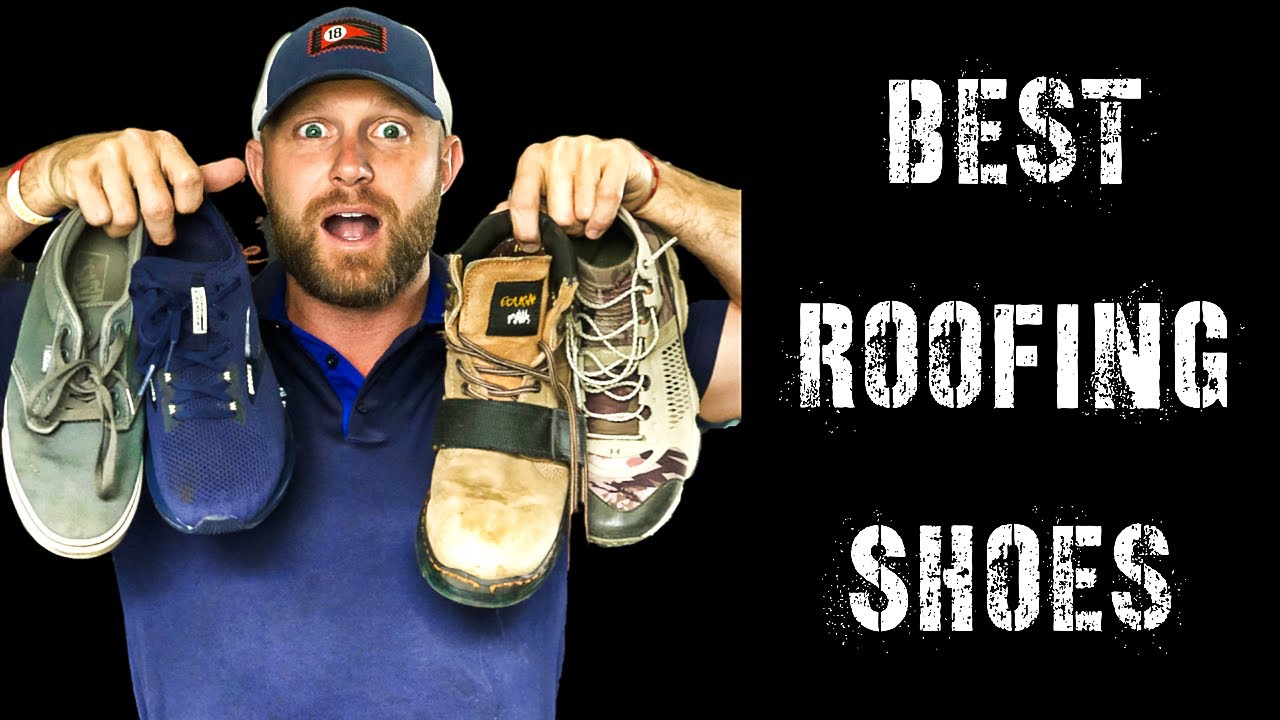The best shoes for shingle roofing are those with excellent grip and comfort. Shoes with soft rubber soles and good ankle support work best.
Shingle roofing requires proper footwear to ensure safety and efficiency. The right shoes provide stability on steep, slippery surfaces. Soft rubber soles offer excellent grip, reducing the risk of slips and falls. Good ankle support prevents injuries, allowing roofers to work longer without discomfort.
Lightweight, breathable materials keep feet cool and dry, enhancing comfort. Durable construction ensures the shoes withstand harsh conditions. Choosing the best shoes for shingle roofing boosts safety and productivity, making them a crucial part of a roofer’s gear. Prioritize quality and comfort to make roofing tasks safer and more efficient.
Importance Of Proper Footwear
Choosing the best shoes for shingle roofing is vital. Proper footwear ensures safety, comfort, and efficiency. Roofers need shoes that provide grip and protection.
Safety Concerns
Safety is the top priority for shingle roofing. Roofers work at heights, so slips can be dangerous. Shoes with non-slip soles are essential. They reduce the risk of accidents. Steel toe caps protect feet from falling objects. Good shoes offer ankle support. This prevents twists and sprains.
Comfort And Efficiency
Comfort improves the roofer’s efficiency. Roofing is hard work, so comfortable shoes reduce fatigue. Cushioned insoles provide support during long hours. Breathable materials keep feet cool. Lightweight shoes prevent extra strain. Efficient footwear means faster, better work. Roofers can focus on the job, not their sore feet.
| Feature | Benefit |
|---|---|
| Non-slip soles | Reduces slipping risk |
| Steel toe caps | Protects from falling objects |
| Ankle support | Prevents twists and sprains |
| Cushioned insoles | Provides long-hour comfort |
| Breathable materials | Keeps feet cool |
| Lightweight design | Prevents extra strain |
Key Features To Look For
Finding the best shoes for shingle roofing is crucial for safety and performance. Understanding key features can help you choose the right pair. Here are the main features to consider:
Slip Resistance
Slip resistance is essential for roofing work. Shingle surfaces can be slippery, especially when wet. Look for shoes with rubber soles that offer a strong grip. The tread pattern should be deep and multidirectional. This ensures maximum traction. Slip-resistant shoes reduce the risk of falls.
Durability
Roofing can be tough on shoes. Durable shoes last longer and provide better protection. Shoes made from high-quality materials are ideal. Leather and reinforced synthetic materials are good choices. Also, check for reinforced toe caps and sturdy stitching. These features enhance the shoe’s lifespan.
Comfort
Comfort is important for any job. Roofing requires long hours on your feet. Shoes should have cushioned insoles and good arch support. Breathable materials help keep your feet cool. Lightweight designs reduce fatigue. A comfortable shoe improves productivity and reduces the risk of foot injuries.
| Feature | Importance | Details |
|---|---|---|
| Slip Resistance | High | Rubber soles, deep tread pattern |
| Durability | High | High-quality materials, reinforced toe caps |
| Comfort | High | Cushioned insoles, breathable materials |
- Slip-resistant shoes reduce the risk of falls.
- Durable shoes last longer and protect better.
- Comfortable shoes enhance productivity.
Top Materials For Roofing Shoes
Choosing the best shoes for shingle roofing can be challenging. The right materials make a big difference. They ensure safety, comfort, and durability. Below, we explore the top materials for roofing shoes.
Rubber Soles
Rubber soles provide excellent grip on shingles. They prevent slips and falls. Their flexibility offers comfort during long roofing tasks. Rubber is resistant to wear and tear. This makes it last longer. Rubber soles also absorb shocks. They protect your feet on rough surfaces.
Breathable Uppers
Breathable uppers keep your feet cool and dry. They prevent sweat buildup. Mesh and synthetic fabrics are common choices. These materials allow air to circulate. Your feet stay comfortable all day. Breathable uppers reduce the risk of blisters. They are lightweight, making movement easier.

Credit: www.reddit.com
Best Shoe Brands For Roofing
Roofing is a tough job that demands the right gear. Choosing the right shoes is crucial for safety and efficiency. There are several brands known for making reliable roofing shoes. These brands offer a variety of features such as slip resistance, durability, and comfort.
Popular Choices
Some brands have become favorites among roofers. They are known for their quality and performance.
- Cougar Paws: Known for their grip and comfort. They have replaceable pads for better traction.
- Timberland PRO: Offers rugged, durable boots designed for all-day wear.
- Merrell: Popular for their lightweight and breathable designs.
- Keen Utility: Known for their strong build and waterproof features.
Budget-friendly Options
Not everyone can spend a lot on roofing shoes. Here are some options that won’t break the bank.
| Brand | Model | Price Range |
|---|---|---|
| Skechers | Workshire | $60 – $80 |
| Ever Boots | Tank | $50 – $70 |
| AdTec | Logger | $45 – $65 |
These brands offer affordable yet reliable options for roofing. They are good choices for those on a budget.
Comparing Shoe Types
Choosing the right shoes for shingle roofing is crucial. It can impact your safety, comfort, and efficiency. Let’s dive into comparing different shoe types to find the best fit.
Boots Vs. Sneakers
Boots and sneakers both have unique benefits for shingle roofing. Understanding their differences can help you make an informed decision.
| Feature | Boots | Sneakers |
|---|---|---|
| Durability | High | Moderate |
| Comfort | Moderate | High |
| Grip | Excellent | Good |
| Protection | High | Moderate |
Boots offer excellent durability and protection. They are ideal for harsh conditions and provide a sturdy grip. Sneakers excel in comfort and are lighter. They might not offer the same level of protection but are easier to wear for longer periods.
Specialized Roofing Shoes
Specialized roofing shoes are designed specifically for roofing tasks. These shoes combine the best features of boots and sneakers.
- Enhanced Grip: These shoes have soles designed for maximum traction.
- Lightweight: They are lighter than most boots, reducing fatigue.
- Comfort: Padded interiors provide extra comfort during long hours.
- Durability: Made from durable materials, they last longer.
Specialized roofing shoes offer the perfect balance between grip, comfort, and durability. They ensure safety while working on shingle roofs. Investing in specialized shoes can make roofing tasks easier and safer.
Maintenance Tips
Keeping your roofing shoes in top condition ensures safety and longevity. Regular maintenance can save you time and money. Follow these simple tips to maintain your shoes.
Cleaning Techniques
Proper cleaning extends the life of your roofing shoes. Clean your shoes after each use. Remove any debris, tar, or dirt. Use a soft brush to scrub off stubborn grime.
- Fill a bucket with warm water.
- Add a mild detergent.
- Dip the brush in soapy water.
- Scrub the shoes gently.
- Rinse with clean water.
- Allow them to air dry completely.
Avoid using harsh chemicals. They can damage the shoe material. A simple cleaning routine keeps your shoes in good shape.
Prolonging Shoe Life
Proper storage and care extend shoe lifespan. Always store shoes in a cool, dry place. Keep them away from direct sunlight. Sunlight can weaken the material.
Rotate your shoes if you have multiple pairs. This reduces wear and tear on a single pair. Inspect your shoes regularly for signs of damage. Replace worn-out shoes promptly.
Consider using a shoe conditioner. It keeps the material supple and strong. A little care goes a long way.
| Tip | Description |
|---|---|
| Regular Cleaning | Prevents buildup of dirt and grime. |
| Proper Storage | Avoids exposure to harmful elements. |
| Shoe Rotation | Distributes wear evenly across multiple pairs. |
| Inspection | Identifies damage early. |
| Use Conditioner | Maintains material flexibility. |
Safety Standards And Certifications
Choosing the best shoes for shingle roofing involves more than comfort. Safety standards and certifications play a crucial role. Understanding these standards ensures you select shoes that protect you.
Osha Guidelines
The Occupational Safety and Health Administration (OSHA) sets strict guidelines. These guidelines are for worker safety on roofs. OSHA requires shoes to have non-slip soles. The soles must grip well on shingles. This reduces the risk of slips and falls.
OSHA also specifies the need for puncture-resistant soles. Roofing areas may have sharp objects. These soles prevent injuries from nails and other hazards. Shoes must provide ankle support too. Proper support prevents sprains and other injuries.
Industry Certifications
Industry certifications ensure shoes meet high safety standards. These certifications come from recognized safety organizations. One important certification is the American National Standards Institute (ANSI). Shoes with ANSI certification pass rigorous safety tests.
Another key certification is the ASTM International. Shoes certified by ASTM meet strict performance standards. They ensure the shoes provide adequate protection on roofing surfaces.
| Certification | Requirement |
|---|---|
| OSHA | Non-slip, puncture-resistant soles, ankle support |
| ANSI | Rigorous safety tests |
| ASTM | Strict performance standards |
- Non-slip soles prevent slips on shingles.
- Puncture-resistant soles protect from sharp objects.
- Ankle support prevents sprains.

Credit: community.windowcleaner.com
User Reviews And Testimonials
Choosing the best shoes for shingle roofing can be difficult. User reviews and testimonials help make informed decisions. Let’s dive into what professionals and DIY enthusiasts say about top roofing shoes.
Professional Roofer Opinions
Professional roofers spend hours on roofs. Their opinions are valuable. Here are some insights:
- John D. – “These shoes offer excellent grip. I feel safe on steep roofs.”
- Emily R. – “Durability is key. My pair has lasted over a year with heavy use.”
- Michael S. – “Comfort is unmatched. No more sore feet after long workdays.”
Diy Enthusiast Feedback
DIY enthusiasts also share their experiences. Their feedback is essential for hobbyists and homeowners. Here are some thoughts:
- Alice T. – “Perfect for weekend projects. They provide the grip I need.”
- Tom B. – “Affordable and reliable. Great for occasional roofing tasks.”
- Laura K. – “Lightweight and easy to wear. My go-to shoes for roof repairs.”

Credit: m.youtube.com
Frequently Asked Questions
What Shoes Are Best For Walking On Shingle Roof?
Wear soft-soled, non-slip shoes with good grip for walking on shingle roofs. Rubber soles provide stability and safety.
What Type Of Shoes Do Roofers Wear?
Roofers wear non-slip, durable work boots with steel toes for safety. These boots provide excellent grip and ankle support. Proper footwear helps prevent accidents and injuries on the job.
How To Safely Walk On Shingle Roof?
Wear soft-soled shoes for grip. Step on the shingle’s center to avoid damage. Use a safety harness. Avoid walking on wet shingles. Move slowly and carefully.
Do Roofers Wear Steel Toe Boots?
Yes, roofers often wear steel toe boots. These boots protect their feet from falling debris and sharp objects.
Conclusion
Choosing the right shoes for shingle roofing ensures safety and efficiency. Prioritize comfort, grip, and durability. The right footwear can make a significant difference. Invest in quality shoes to protect yourself. Happy roofing!

